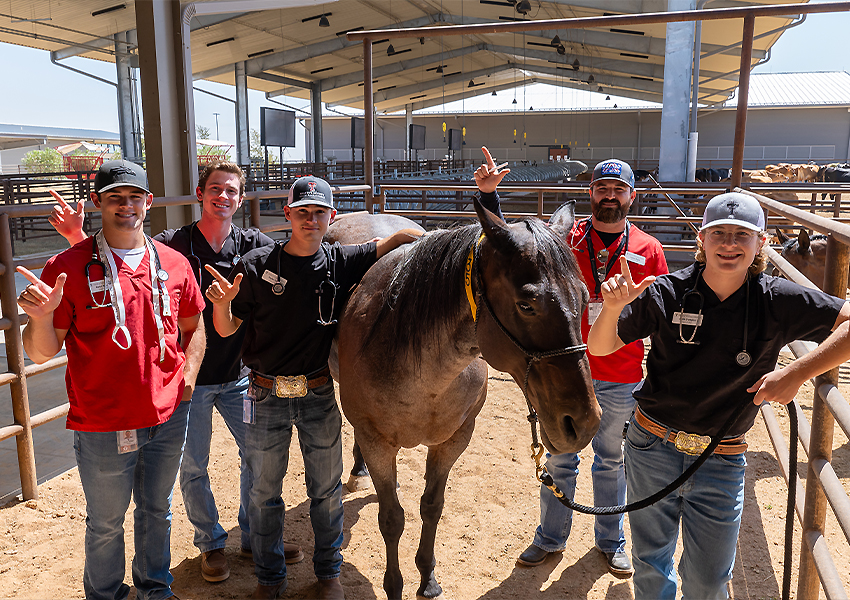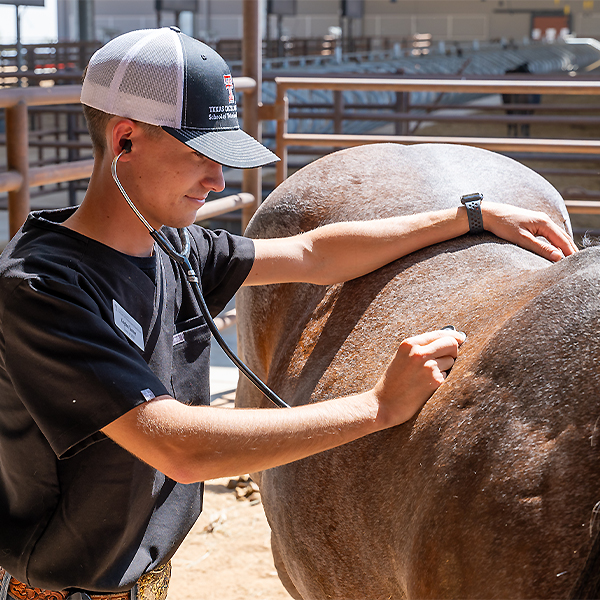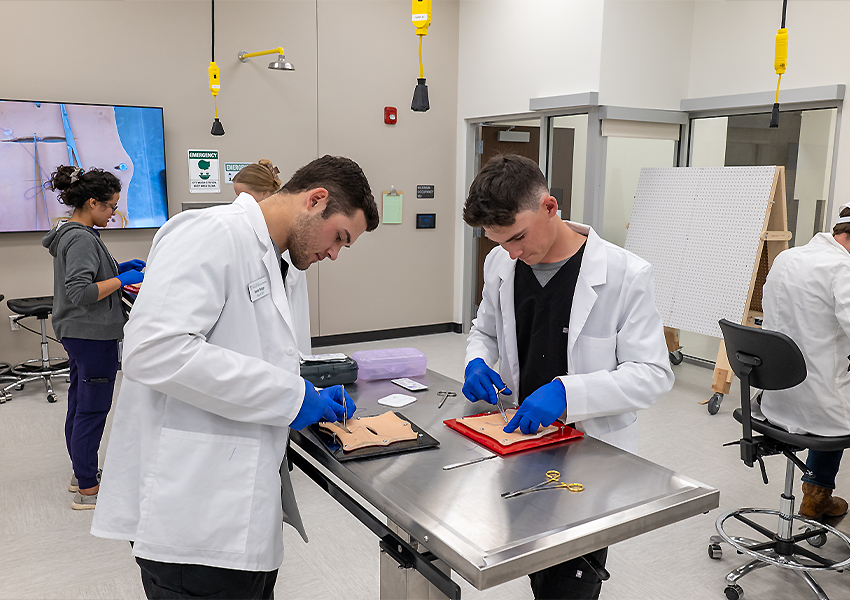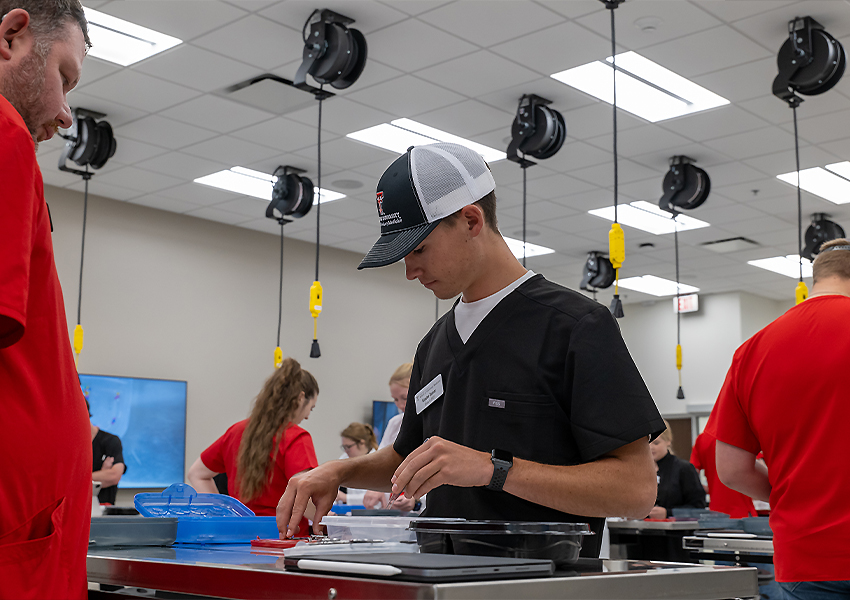
This student’s dream is to serve the veterinary needs of rural and regional communities.
Kayden Tanner has had many influences growing up that would point him toward his quest in becoming a veterinarian. One of those inspirations is his dad, Dr. Marty Tanner, owner of a premier equine referral center called Tanner Equine Sports Medicine and Rehabilitation in Millsap, Texas.
“I learned a lot by watching my dad sacrifice and make a commitment to provide a good living for our family, and that made a huge impact on me,” Tanner said. “He placed value on his work and the responsibility he had to his practice and his clients.”
Tanner would agree that growing up in a rural community has had a significant impact on his life as well. In fact, he grew up on a greyhound farm that taught him about small animal care, breeding, training and health maintenance.
He was also heavily involved with 4-H which allowed him to learn all aspects of animal care across multiple species. Through 4-H, he was able to raise and exhibit breeding show heifers at livestock shows.
These opportunities gave him a unique glimpse into his future as a rural veterinarian. Now he is in his first year of veterinary school at Texas Tech University’s School of Veterinary Medicine in Amarillo. It is a program whose purpose aligns perfectly with his roots.
“Understanding rural America and their values and expectations is especially important to any business located in an agricultural community,” Tanner said. “Having a veterinarian who understands this is crucial.”
His unique story has molded him to be the person he is today, and he looks forward to making an impact in rural communities through veterinary medicine. Let’s get to know Tanner through a series of questions.
What are you passionate about in veterinary medicine?
I have been exposed to the sports medicine aspect of equine medicine my entire life. I learned early on how vital a healthy equine athlete is to an owner. In many cases, that equine athlete is the only source of income for a client. They depend on their veterinarian to keep their horses healthy and sound so they can earn a living.
For over 10 years, I have been attending the National Finals Rodeo (NFR) in Las Vegas and in those years, I began assisting my dad with veterinary needs of his clients who compete at this event. At this level of competition, I learned just how heavily clients rely on their veterinarian. You become part of a team, and their success partly depends on your ability to keep their horse sound, healthy and ready to compete. The work we do makes a significant difference in their performance during each night of the event. I have always found this to be one of the most rewarding experiences. Over the years, rodeo has become part of my life. I can’t imagine choosing any other path than Equine Sports Medicine.
What are some life experiences that led you to that passion?
Growing up in the shadow of an equine and bovine referral hospital reinforced the hard work I had already been taught, but on a different level. These veterinarians have constantly challenged me to be the best I can be, whether jogging a horse, cleaning a stall, or scrubbing a joint. They taught me that learning every aspect of veterinary medicine will give me an advantage. The exposure was not only about gaining clinical knowledge, but it also enabled me to acquire important communication and personal skills.
As part of my dad’s profession, he deals with a lot of people on a daily basis. I learned the importance of professionalism by listening to him on the phone when he would get calls after hours or during family time. I learned that happy clients meant a successful business. Was he always happy when the phone rang at 2 in the morning to cut a colic? No, but I watched him get out of bed, work several hours, return home to shower and go back to work for the day. This exposure taught me about commitment, work ethic and dedication. I learned that a good relationship with your clients is crucial to a successful practice.
From an up close and personal experience, I know what is expected of a rural veterinarian. It means a multi-species practice, emergency calls, high demand with no set hours, and lots of late-night calf pulling. I understand that sacrifices must be made, especially early on in my career. My experiences over the last 22 years have been like looking through time at what my life will be like after graduation. It is almost like I have already lived out my future. My experiences have prepared me for the good and the bad that comes along with an established equine sports medicine practice. There are things I hope to do differently and things I don’t know if I will ever accomplish, but I plan on giving it my best.
What inspires you to pursue what you love to do every day?
Clients have constantly challenged and encouraged me to be as good as the examples in my life. There is no question that I have had some of the most amazing veterinarians as examples. The imprint they have left on my life makes me strive even harder to be the best I can be.
There are high expectations of me stepping into my dad's practice and ultimately taking
it over one day. In truth, that puts a lot of pressure on me at times. I am extremely
thankful for the amazing mentors in my life who are always encouraging me to follow
my own path and not necessarily the one everyone assumes I will take. 
I am also thankful for my faith and the support I have from my family. There is truly no doubt in my mind that the path I am on is the right path for me. I am motivated and determined to make my parents proud and assure my dad that I will take great care of his clients.
How do you plan to go back and help your community?
There has never been a question in my mind about where I wanted to be after graduation. My plans are to join Tanner Equine Sports Medicine and Rehabilitation and learn as much as possible from my dad before he “officially” retires. I am certain that he will be around a lot, even if he says he is retired.
As for serving my community, I plan to focus on clients who depend on their livestock to make a living. I expect and want to be highly involved in the agricultural aspect of the community. I would love to provide services to local 4-H and National FFA Organization chapters or assist local livestock ranchers in herd management programs. I expect to be stopped by locals who just have a “quick” question and I expect to get phone calls at all hours of the day and night.
Rural living has been good to our family and I hope to be able to invest back into the communities that invested so much in me. Living in a rural community is like being surrounded by family. It is a place where families remain generation after generation. Being a part of my dad’s practice means I will be taking care of children and grandchildren of many clients I knew growing up.
Why did you choose Texas Tech? 
I was not all that familiar with Texas Tech University’s School of Veterinary Medicine until Dr. Britt Conklin, the associate dean for clinical programs at the School of Veterinary Medicine, approached my dad about his veterinary practice, Tanner Equine Sports Medicine and Rehabilitation, becoming one of the clinical practice partners. At that point, we decided we should go to Amarillo for a tour. I knew the minute I walked on campus that it was where I wanted to attend. My decision was confirmed when my parents felt the exact same way. The emphasis they place on clinical skills exceeded all the other veterinary schools I had on my list. The clinical practice experience during our fourth year is going to give School of Veterinary Medicine graduates a major advantage after graduation.
The focus they place on rural practices is also very important to me. I cannot see myself practicing anywhere but in a rural area. It is the perfect fit for my future plans and the only place I could see myself. I am almost through my first semester, and I am more certain than ever that the School of Veterinary Medicine is the perfect fit for me.
What was your reaction when you got the call that you were accepted to the School of Veterinary Medicine?
I was sweating it all day! One of my friends got a call early that morning, so I knew they had started making the calls. I had applied to one other school and been accepted, but never felt like it was a good fit for me. At this point, Tech was the only school on my radar. I don’t know if it was because my name is far down in the alphabet or if Dr. Conklin enjoyed making me wait all day, but my phone did not ring until early evening. It was a huge relief and solidified my future!
What are your favorite things to do outside of school?
Some of my hobbies are bass fishing and big game hunting. During my junior and senior years of high school, I started a fishing tournament through the Texas High School Bass Association. I continued at the college level, as part of the Tarleton State University Collegiate Bass Team. Like a lot of college clubs and sports, it is difficult to go anywhere past the college circuits. My last two years of college undergrad, I made the decision to fish professionally. The Bass Open tournaments have a rigorous schedule that allowed me to fish all across the country.
The year I applied for veterinary school was also the year that I made the decision to try and make the jump to the highest level of professional bass fishing. The last event of the season, I was well within the points to make the cut and live out my dream. At this time, I had already been accepted into two veterinary schools and had major decisions to make. I went into the tournament praying for God’s will to be done in this next stage of my life. As the dust settled after weigh-in during the fishing tournament, I ended up missing the cut by only six points. Because I had placed my future in God’s hands, I was able to walk away knowing that veterinary school was my immediate future. I have every intention of going back to tournament fishing after graduation. It won’t be the rigorous schedules like I have done in the past, but I will 100 percent return to tournament fishing on some level.
